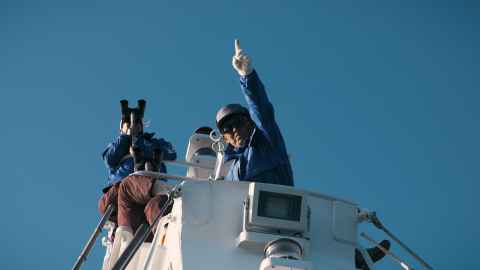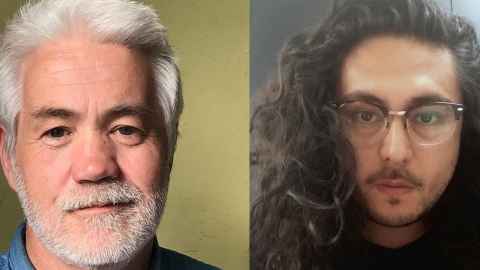Film-makers show what a former whaling village now says about whaling
4 October 2021
Ben Goldson talks to Elam film-makers about their whaling documentary 'Ayukawa: The Weight of a Life' screening at the NZ International Film Festival.

It’s good to have something to look forward to and events like Whānau Mārama, the New Zealand International Film Festival, need our support – whether that be in the cinema in 2021 or online.
The festival runs from 29 October to 14 November and includes the premiere of a documentary co-directed by Associate Professor Jim Speers (Elam, Faculty of Creative Arts and Industries) and Tu Rapana Neill (Elam alumnus). (Update: Unfortunately the Auckland leg of the Festival won't go ahead this year because of the Covid-19 alert levels. See footnote for dates in other venues.)
Ayukawa: The Weight of a Life is named after the small town that’s the subject of the film. The project was first conceived in 2015, as the residents of Ayukawa faced the decline of the whaling industry as well as the lasting impact of the devastating 2011 earthquake that struck the east coast of Japan.
“It’s our first feature-length documentary project for both of us,” says Jim, who started out as a sculptor before moving into video.
“I’ve previously worked on projects that have resulted in video installations for art galleries. The difference here is the film’s duration and how people are likely to experience the story. We focused on the thoughts of our subjects. Communicating their position to an audience was the priority.”
Tu has worked in Japan previously, making music documentaries.
“I told Jim I’d been thinking about making a film on whaling. It’s a subject we feel passionate about in New Zealand, but I didn’t know much about it.”
Prior to filming, Tu and Jim met with Japan’s Ministry of Agriculture, Forestry and Fisheries to outline why they were travelling to Ayukawa.
“We realised quite early on that we would have to meet the Ministry and explain our intentions – that we didn’t want to make an explicitly anti-whaling film, but we also weren’t making a pro-whaling film,” says Tu. “It was really just about this town and trying to give a Western audience an insight into something we don’t often see.”
What I think about whaling is far less interesting than how the people living there feel about it. We let them tell their story.

Jim and Tu, son of Emeritus Professor Michael Neill, met at Elam more than a decade ago and had already worked together in China as part of the Field Recordings collective. Their initial intention was to create a broader piece about whaling in Japan before deciding on one location, Ayukawa.
Jim received a research grant from the University and the pair were joined by another Elam graduate, Kentarô Yamada, who co-wrote and co-produced Ayukawa. Filming began in 2018 and was completed in 2020 after a number of visits. Having gained intimate access to Ayukawa and its residents, Jim and Tu express hope that their documentary will move the conversation away from attempting to shame the Japanese people into ceasing their whaling operations.
The pair learned a lot about the history of Japanese whaling while filming. An Ayukawa resident they interviewed estimated 80 percent of the town was at one point reliant on whaling.
“But they recognise the industry’s not coming back,” says Jim. “They’re cognisant of the fact that there isn’t a demand for the product, and that conditions have changed.
“The situation post-war that led to the boom in whaling no longer applies and yet it continues. Our film aims to understand why.”
The situation post-war that led to the boom in whaling no longer applies and yet it continues. Our film aims to understand why.
Stylistically, the documentary is shot in an observational format. Tu says it was important to put the stories of their subjects first, as opposed to the personal opinions of the film-makers.
“I was interested in the subject, not how I perceived the subject. What I think about whaling is far less interesting than how the people living there feel about it. We let them tell their story.”
Jim says the observational nature of the film, which centres on the townspeople, also reflects the film-makers’ place as outsiders in Ayukawa.
“You make the film based on the information you have,” he says. “What that involved for us was just trying to observe what occurred in that place, and talking to people. We would finish an interview with someone and we’d ask, ‘who’s the best person to talk to about Ayukawa in the post-war years’, and they would suggest someone else.”
Ayukawa (Japanese with English subtitles) is at Whānau Mārama: the New Zealand International Film Festival. The festivals runs 29 October to 14 November. It opens in Christchurch on October 29, Wellington on November 4 and Dunedin on November 5, followed by nine regional centres.
The Auckland leg of the festival has had to be cancelled for 2021.
Trailer below.
This story first appeared in the October 2021 issue of UniNews.